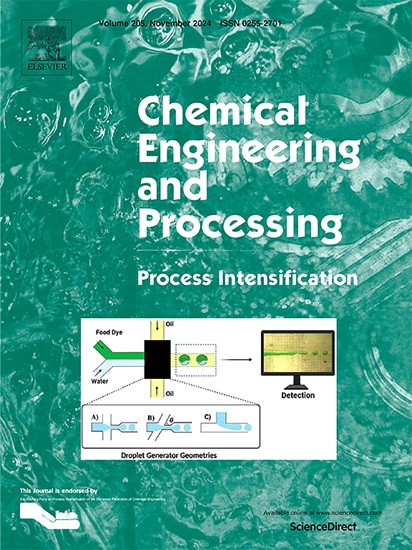Sustainable Refining: Enhancing Energy Efficiency in Crude Distillation Processes
IF 3.8
3区 工程技术
Q3 ENERGY & FUELS
Chemical Engineering and Processing - Process Intensification
Pub Date : 2025-05-01
DOI:10.1016/j.cep.2025.110326
引用次数: 0
Abstract
Crude oil distillation is a crucial separation process in the petroleum refining industry, where crude oil is fractionated into various components based on their boiling points. This energy-intensive industrial process significantly contributes to global energy consumption and greenhouse gas emissions. Given the magnitude and environmental implications of crude distillation operations, there is an urgent need to analyze energy usage patterns rigorously and identify opportunities for enhancing efficiency. This review explores the extensive efforts made by researchers to develop advanced models and techniques for the techno-economic evaluation of crude distillation systems. It begins by highlighting the considerable energy demands and emissions associated with conventional crude distillation units (CDUs). Emphasizing the necessity of comprehensive energy analysis, the paper discusses how optimization strategies can improve CDU operations and enable retrofits aimed at reducing both energy consumption and environmental impacts. Various modeling approaches are examined, including rigorous process simulations using tools like Aspen HYSYS and innovative exergy-based analyses, which provide deeper insights into the thermodynamic principles and operational factors influencing CDU performance. The review focuses on key areas such as distillation tower configurations, operating conditions, and heat exchanger network designs, all aimed at identifying energy-efficient modifications. Additionally, the paper discusses advancements in process intensification techniques, including Dividing Wall Columns, Hybrid Distillation, and reactive distillation. These methods not only enhance separation efficiency but also contribute to significant reductions in energy usage. The findings from numerous case studies are synthesized, demonstrating their effectiveness in improving overall efficiency.
可持续精炼:提高原油蒸馏过程的能源效率
原油蒸馏是石油炼制工业中一个至关重要的分离过程,在这个过程中,原油根据其沸点被分馏成各种组分。这一能源密集型工业过程对全球能源消耗和温室气体排放做出了重大贡献。鉴于原油蒸馏操作的规模和对环境的影响,迫切需要严格分析能源使用模式,并确定提高效率的机会。本文综述了研究人员在开发用于原油蒸馏系统技术经济评价的先进模型和技术方面所做的广泛努力。本文首先强调了与传统原油蒸馏装置(cdu)相关的大量能源需求和排放。本文强调了综合能源分析的必要性,讨论了优化策略如何改善CDU运行,并实现旨在减少能源消耗和环境影响的改造。研究了各种建模方法,包括使用Aspen HYSYS等工具进行严格的过程模拟,以及创新的基于火用的分析,这些方法可以更深入地了解影响CDU性能的热力学原理和操作因素。审查的重点是关键领域,如蒸馏塔配置、操作条件和热交换器网络设计,所有这些都旨在确定节能改造。此外,本文还讨论了过程强化技术的进展,包括分壁塔、混合精馏和反应精馏。这些方法不仅提高了分离效率,而且有助于显著减少能源的使用。综合了许多案例研究的结果,证明了它们在提高整体效率方面的有效性。
本文章由计算机程序翻译,如有差异,请以英文原文为准。
求助全文
约1分钟内获得全文
求助全文
来源期刊
CiteScore
7.80
自引率
9.30%
发文量
408
审稿时长
49 days
期刊介绍:
Chemical Engineering and Processing: Process Intensification is intended for practicing researchers in industry and academia, working in the field of Process Engineering and related to the subject of Process Intensification.Articles published in the Journal demonstrate how novel discoveries, developments and theories in the field of Process Engineering and in particular Process Intensification may be used for analysis and design of innovative equipment and processing methods with substantially improved sustainability, efficiency and environmental performance.

 求助内容:
求助内容: 应助结果提醒方式:
应助结果提醒方式:


